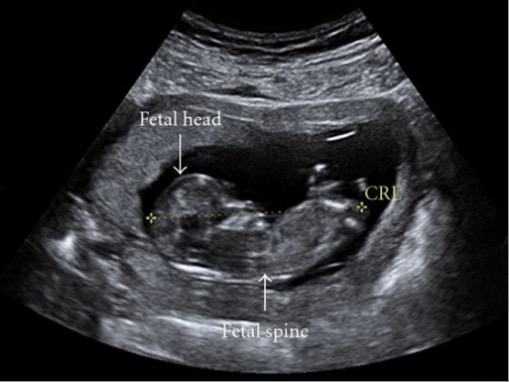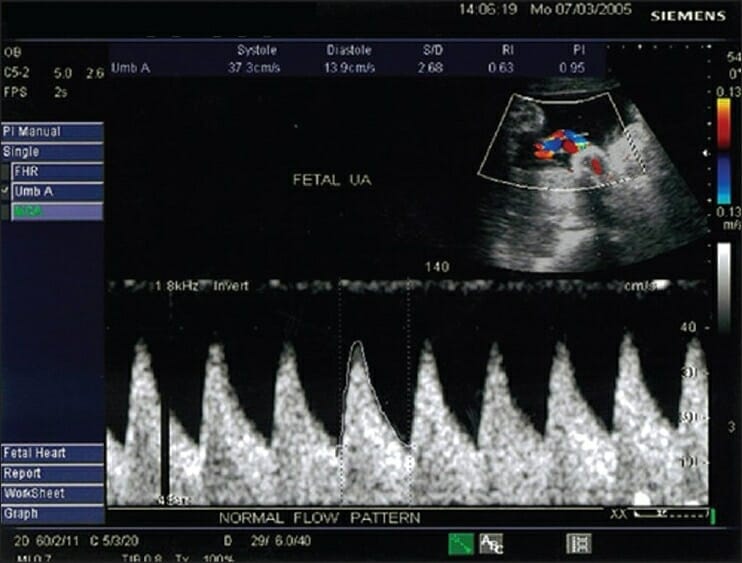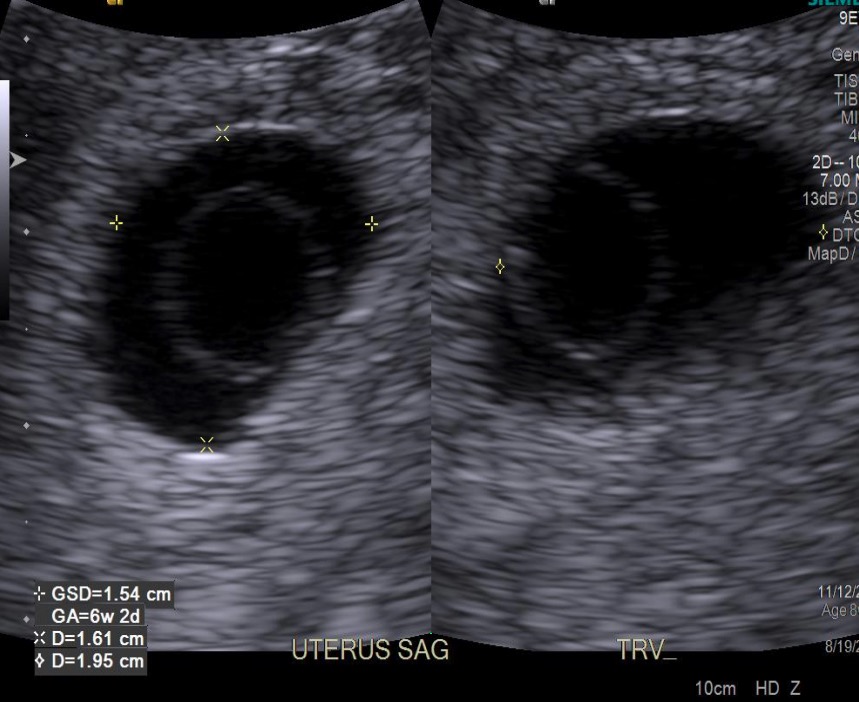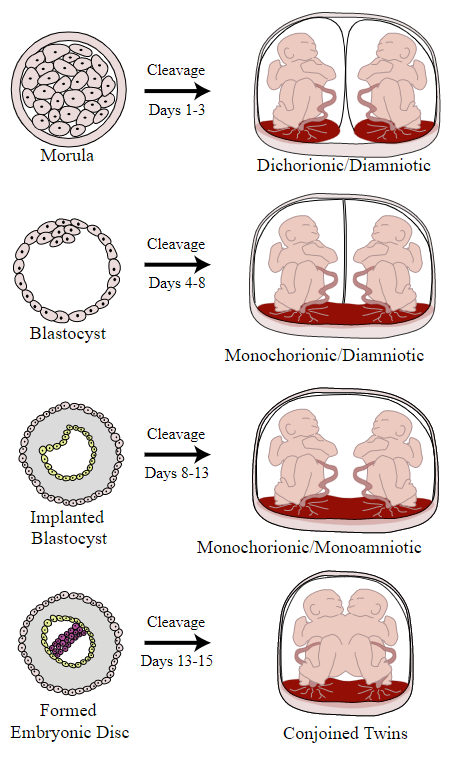Playlist
Show Playlist
Hide Playlist
Antenatal Care: Establishing Gestational Age with Ultrasound
-
Slides RoutineCare Obstetrics.pdf
-
Download Lecture Overview
00:01 So moving on to that ultrasound and establishing the gestational age. 00:06 Again using ultrasound the 1st trimester is the most accurate. 00:10 How we use it? We measure the crown-rump length. 00:13 So the distance from the crown of the fetus to the rump. 00:16 We expect that to be within one week of the last menstrual period. 00:21 So let me explain that in a little bit detail. 00:23 If by a patient's last menstrual period, the fetus is measuring 8 weeks and 2 days. 00:29 And by our ultrasound, the measurement is 6 weeks and 5 days. 00:34 We would refer to the ultrasound. 00:37 Last menstrual period again is only accurate if it's a 28 day cycle and it's regular. 00:43 The ultrasound is only going to tell us how far along the pregnancy is based on the date of conception. 00:49 So in that case we will go with the gestational age the ultrasound is giving us. 00:53 Let me give you another example. 00:55 If the last menstrual period says the patient is 7 weeks and 2 days, and our ultrasound says she's 7 weeks and 5 days, which one would we choose. 01:05 You guessed it right. 01:06 We would use the last menstrual period. 01:08 Because the last menstrual period in the ultrasound are within one week of each other. 01:14 Now, in the 2nd and 3rd trimester, we can still use that for establishing gestational age. 01:19 But it is not quite as accurate as we do in the 1st trimester. 01:21 In the 2nd and 3rd trimester we use the biparietal diameter which is the distance between the parietal bones in the head. 01:30 We use the abdominal circumference. 01:32 And we use the femur length to determine the gestational age. 01:34 Now here is a little rule. 01:36 In the first trimester, the ultrasound can be off by one week. 01:39 2nd trimester two weeks, third trimester three weeks. 01:44 So why the big difference. 01:45 Why does it increase as a gestational age increases. 01:48 Well there are many things that influence the size of the fetus as we get into 2nd and 3rd trimester. 01:53 Their fetal factors, their maternal factors, their placental factors. 01:58 Again as we discussed in the 1st trimester, the only thing that influences the gestational age is the date of conception. 02:07 So let's move to another question. 02:10 A 23 year old presents to the emergency room with complaint of left lower quadrant pain. 02:14 She states that the pain is 3 out of 10. 02:18 She states she has slight vaginal bleeding. 02:20 And she reports a positive pregnancy test approximately 6 weeks ago. 02:24 This is her first pregnancy. 02:26 She has no other medical problems or surgical history. 02:29 On physical exam, vital signs are stable and she is afebrile. 02:33 On sterile speculum exam, you see slight vaginal bleeding. 02:37 And then by manual exam, she has slight tenderness in the left lower quadrant. 02:41 Lab result show that her beta-hcg is 400 milligrams per decaliter. 02:46 On the transvaginal ultrasound, there is no gestational sac in the uterus, there is no free fluid in the pelvis. 02:52 And the adnexa are within normal limits. 02:55 So what is the next best step in her management? A. Admit the patient to the hospital and prepare her for surgery. 03:03 B. Reassure the patient that her pregnancy is normal and her pain is expected for her gestational age. 03:08 C. Proceed with medical management as patient most likely has an ectopic pregnancy. 03:13 or D. Repeat the beta-hcg and ultrasound in 48 hours. 03:17 The answer for this one is D. 03:19 Remember that we don't see anything on transvaginal ultrasound in the uterus, until the beta-hcg is at least 2000. 03:27 With this patient her beta-hcg was only 400. 03:30 So this may very well be a normal pregnancy. 03:32 However, may be an ectopic pregnancy. 03:35 We really just don't have enough information to tell. 03:37 So the correct answer is to repeat the beta-hcg in 48 hours. 03:41 Because we do expect it to rise by 50% if this is a normal pregnancy. 03:45 And then repeat the ultrasound. 03:47 Because we may be able to see something in the uterus by that time. 03:52 So just to recap. 03:54 This is the high-yield information that you need to know for this lecture. 03:57 Confirming pregnancy and establishing gestational age. 04:00 Pregnancy can be established by last menstrual period. 04:03 Urine or serum pregnancy test or ultrasound. 04:06 The last menstrual period is the most accurate for establishing gestational age if it's consistent with the transvaginal ultrasound. 04:14 If the last menstrual period is unknown, 1st trimester ultrasound is the most accurate way to establish the gestational age. 04:22 When the beta-hcg is greater than 2000 milligrams per decaliter, gestational sac should be seen on ultrasound. 04:29 And then remember that other little fact I told you. 04:32 In the 1st trimester, the ultrasound should be within one week of the last menstrual period. 04:36 In the 2nd trimester, two weeks. 04:38 And in the 3rd trimester, three weeks.
About the Lecture
The lecture Antenatal Care: Establishing Gestational Age with Ultrasound by Veronica Gillispie, MD, MAS, FACOG is from the course Antenatal Care.
Included Quiz Questions
A 20-year-old woman comes to your office to confirm dates for her pregnancy. She is certain the first day of her last menstrual period was 8 weeks and 5 days ago. On transvaginal ultrasound, the crown-rump length corresponds to an estimated gestational age of 6 weeks and 2 days old. Which method is most accurate for estimating the due date?
- The gestational age calculated by transvaginal ultrasound should be used to calculate the estimated due date.
- The gestational age based on her last menstrual period should be used to calculate the estimated due date.
- An average gestational age should be calculated based on her last menstrual period and the transvaginal ultrasound.
- Neither gestational age should be used. A more accurate dating scan should be done in the second trimester.
- A repeat transvaginal ultrasound must be done later in the first trimester to determine an accurate gestational age.
Which of the following statements about ultrasound accuracy in determining gestational age is FALSE?
- Second-trimester ultrasounds are most accurate for establishing gestational age.
- First-trimester ultrasounds can estimate the gestational age within one week of accuracy.
- Second-trimester ultrasounds can estimate the gestational age within two weeks of accuracy.
- Third-trimester ultrasounds can estimate the gestational age within three weeks of accuracy.
- If a first-trimester ultrasound measures a gestational age within one week of the last menstrual period, the last menstrual period should be used to establish the gestational age.
A 32-year-old woman presents to your office to determine the gestational age of her pregnancy. She states that her last menstrual period was 8 weeks ago. The crown-rump length on ultrasound is consistent with a gestational age of 7 weeks and 5 days. What is the gestational age of the pregnancy?
- 8 weeks 0 days
- 7 weeks 5 days
- 7 weeks 6 days
- Unable to determine given inconsistency of LMP and first-trimester ultrasound
- 8 weeks 5 days
A 34-year-old woman presents to your antenatal clinic to determine the gestational age of her pregnancy. Her last menstrual period was between 6 and 9 weeks ago. What is the most accurate way to establish the gestational age of her pregnancy?
- A first-trimester measurement of the crown-rump length on transvaginal ultrasound.
- A first-trimester measurement of the biparietal diameter on transvaginal ultrasound.
- A second-trimester measurement of the biparietal diameter, abdominal circumference, and femur length on transabdominal ultrasound
- A serum human chorionic gonadotropin level
- A second-trimester crown-rump length on transabdominal ultrasound
What factors can lead to variability in fetal size in the second and third trimesters?
- Fetal, maternal, and functional placental factors
- Maternal and functional placental factors only
- Fetal factors only
- Date of conception only
- Ultrasound technique variability only
Which of the following measurements on second-trimester ultrasound factors into the calculation of the estimated gestational age of a fetus?
- Biparietal diameter
- Chest circumference
- Tibia length
- Placental thickness
- Crown-rump length
Customer reviews
4,0 of 5 stars
| 5 Stars |
|
1 |
| 4 Stars |
|
0 |
| 3 Stars |
|
1 |
| 2 Stars |
|
0 |
| 1 Star |
|
0 |
Great topics, helps with learning and retention! Highly recommended the ON videos!
it is very basic, not in detailed lecture,try to tell topic in detailed manner







